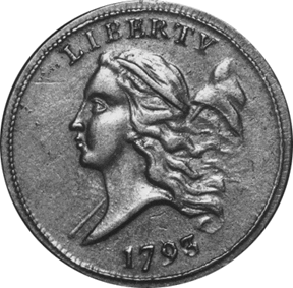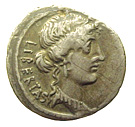

|
|
|
|
|
|
|
|
When we think of the Roman pantheon of gods, we think of Jupiter, Juno, Janus, Mars, Cupid, Venus, etc. The Romans, however, also liked to personify and deify abstractions, such as behaviors, philosophical ideals, and conditional states of being. They, of course, do not hold the monopoly on this practice; examples of such abstractive deification can be found around the world, most recently in the "Christian" nation of the United States of America.
Every nation has its god. According to 2 Kings 17:29-31, the Babylonians had Succoth-benoth, the people of Cuthah had Nergal, the people of Hamath had Ashima, the Avites had Nibhaz and Tartak, and the Sepharvites had Adrammelech and Anammeleh.
This may come as a shock to you, but The United States is no different. One of the best examples to reveal just who that god is can be found on our country's coinage.
Reach into your pocket and take out a coin. Contemporary coins bear the faces of presidents and historical figures: John F. Kennedy, George Washington, Franklin Roosevelt, Thomas Jefferson, Abraham Lincoln, Susan B. Anthony, and Sacagawea. In addition, you will find the motto, "In God We Trust." This is a motto that we can all rally behind, particularly those of the Christian faith.
Recently, though, I heard in my spirit the words, "They worship Liberty." I began to wonder whether the words of our nation's motto hold the same meaning for me as it does for those who authorized it to be engraved on our money. Is it more than just a coincidence that on every U.S. coin, the words "In God We Trust" share the same side as the word "Liberty?" Is Liberty in fact the god in whom America trusts? Surely the word "Liberty" is emblazoned on our money to represent the philosophical idea, and not some deity. One need only look to the coins of the past to see what "Liberty" truly represents.
Instead of dead presidents, almost every coin minted by the United States in the 18th and 19th centuries, as well as quite a few in the 20th century, bore the image of Liberty, a metaphorical representation of the new nation. It is this image that inspired the colossal Statue of Liberty that stands in New York Harbor.
She is also called Freedom and Columbia (apparently in honor of Christopher Columbus). She is prominently displayed at the National Cemetery of the Pacific, and high atop government buildings like the U.S. Capitol and the Salt Lake City (Utah) Council Chamber. Her image is also recognizable from the logo of Columbia Pictures. During the American Revolution, Columbia became the goddess protecting America against Britannia, the goddess of Great Britain. For example Phyllis Wheatley sent a poem to General Washington in 1775, and it was published in the Pennsylvania Magazine in 1776, which contained these passages:
Celestial choir! enthron'd in realms of light,
Columbia's scenes of glorious toils I write.
While freedom's cause her anxious breast alarms,
She flashes dreadful in refulgent arms....
Fix'd are the eyes of nations on the scales,
For in their hopes Columbia's arm prevails.
Anon Britannia droops the pensive head,
While round increase the rising hills of dead.
Ah! cruel blindness to Columbia's state!
Lament thy thirst of boundless power too late.
Proceed, great chief, with virtue on thy side,
Thy ev'ry action let the goddess guide.
A crown, a mansion, and a throne that shine,
With gold unfading, Washington be thine.
Upon examining the images of Columbia (Lady Liberty), Britannia, and the French version, Marianne, it can quickly be discovered that they are all modern adaptations

|
| Figure 1: Roman Denarius silver coin about 50 B.C. Depict- ing the goddess Libertas (Liberty). |

|
| Figure 2: 1793 U.S. Liberty Cap Half Cent. |
My dear friends, we have been duped. In our naivete, we have become so enamored by the perceived liberties of America, that we have missed the fact that Liberty is more than just a personification of a concept, but it is paganism at its worst.
You may say, "I don't worship Liberty, or her statue." No? Consider how Americans feel about their liberties. Even Christians, when they feel their "Constitutional rights" are threatened, are willing to fight for them using any means necessary: legal, financial, even physical. This in spite of the fact that we are admonished by the Lord Jesus Christ, who said, "I say unto you, That ye resist not evil" (Matt. 5:39).
Do we have an "inalienable right" to liberty? If so, then how could Paul say, "Let every man abide in the same calling wherein he was called. Art thou called being a servant? care not for it: but if thou mayest be made free, use it rather. For he that is called in the Lord, being a servant, is the Lord's freeman: likewise also he that is called, being free, is Christ's servant" (1 Cor. 7:20-23).
While many Americans claim Jesus as their Lord, and many others claim no lord at all, nearly all Americans have committed their lives to the service of Liberty. The ideals of Freedom, as defined by the American ethos, trump, even in the minds of most Christians, the ideals of Christianity. Many a Christian has expressed, in his or her life, the belief that, "Yes, I know God said that, but He wants us to be happy. He wants us to be free to enjoy what life has to offer." Although it would appear that Christians are called to be the servants of Christ, many choose, rather, to be the servants of life, liberty, and the pursuit of happiness.
I am a child of God. Therefore, my liberty is not a product of the Constitution of the United States of America. My liberty is not guaranteed by the full faith and credit of the U.S. government.
The Scriptures do not declare, "If the Constitution therefore shall make you free, ye shall be free indeed," but rather "If the Son therefore shall make you free, ye shall be free indeed" (John 8:36). Praise be to His holy name!
We have watched our legal liberties erode in the last few years. While it saddens me, and sends many Christians into a violent panic, I am not dismayed.
Take away the Constitution. Give me Jesus. Take away the Bill of Rights. Give me Jesus. Take away my freedom. Give me Jesus.
America is NOT my home, I am just passing through. Though a citizen of America by law, in my heart I am a pilgrim: a stranger in a strange land.
So, what is the duty of man? Is it to pursue life, liberty and happiness? Not according to the Word of God. "Fear God, and keep his commandments: for this is the whole duty of man. For God shall bring every work into judgment, with every secret thing, whether it be good, or whether it be evil" (Eccl. 12:13-14).
Thou shalt have no other gods before the Lord: not even Liberty. Neither shalt thou make any graven images, or any likeness of any thing that is in heaven above, or in the earth beneath: not even Liberty. But thou shalt stand fast in the liberty wherewith Christ hath made us free, and thou shalt worship the Lord thy God, and him only shalt thou serve.
And if it seem evil unto you to serve the Lord, choose you this day whom ye will serve; whether the goddess Liberty which your fathers served, or the other gods of America, the land in which ye dwell: but as for me and my house, we will serve the Lord. His name, and His alone, be praised forever and ever. Amen. &
Next Article - Science and the Bible